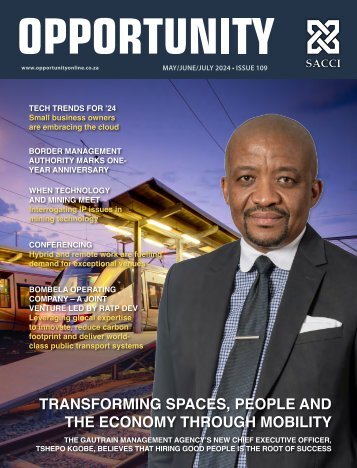South African Business 2016 edition
- Text
- Investment
- Government
- Business
- Development
- Network
- Sectors
- Investing
- Business
- Africa
- African
- Economic
- Manufacturing
- Mining
- Opportunities
- Economy
- Overview
OVERVIEW ICT development
OVERVIEW ICT development in South Africa South Africa has the opportunity to realise great benefits by increasing its investments in the information and communications technologies (ICTs) infrastructure, which will ultimately drive the country’s social and economic transformation. According to the latest World Economic Forum’s Global Information Technology Report 2015 (GITR), sponsored by Cisco, which measures the relative capacity of 143 economies to leverage ICTs for growth and economic and social transformation, South Africa dropped five places to 75th in terms of the report’s Networked Readiness assessment. Networked readiness is a crucial indicator of a country’s ability to implement and take full advantage of ICTs. Cathy Smith, General Manager for Cisco South Africa, says South Africa can make massive strides in connecting more citizens and bringing about positive social and economic change by improving its Networked Readiness. “With political will and commitment from the private sector, progress can be made in bringing the benefit of ICTs to all South Africans. As we face the next wave of the Internet – the Internet of Everything (IoE) –South Africa needs to prioritise ICT development if it is to benefit from the new experiences and efficiencies that the IoE will bring. “At Cisco, we have learned that technology helps people find innovative solutions to address societal problems. We believe there has never been a better time to combine human ingenuity and technological innovation to improve the lives of all South Africans. Technology is at an inflection point and the South African economy needs to prioritise ICT adoption to take full advantage of the benefits that embracing digital transformation strategies will offer,” says Smith. Drawing from the various discussions that were held at the recent SAP Urban Matters event in Cape Town, we find a surprisingly enthusiastic new assortment of government officials willing to engage critically and in an innovative way with the issues that have arisen over the past few decades. On the topic of ICT integration in an African context, Nirvesh Sooful from African Ideas elaborated on the importance of including these strategies in local government practices to enhance their efficiency. “With the challenges that we have, we need efficient and cost-effective government, as all available resources need to be spent on dealing with our massive infrastructure backlogs. One of the challenges facing South Africa, is the burgeoning cost of government administration, without the necessary investment in infrastructure. This is a very dangerous position. Technology can help. In fact, it is the only real answer. We need to increase our investment in effective technology so that we can reduce the running costs,” Sooful said. Innovative governance and leadership practices were also important topics covered at the event and looked at best practices from cities within our country, as well as case studies presented on best practices from cities abroad. Sean O’Brien, vice president (global) of SAP Urban Matters & Public Security, discussed the broader theme of improving the lives of citizens by integrating innovative governance and leadership practices through transforming government and driving prosperity. He proposed that five government pillars be put in place: good governance, user empowerment, urban resilience, service innovation, and SOUTH AFRICAN BUSINESS 2016 122
OVERVIEW community engagement. The five SAP strategy pillars that seek to integrate technology with the aforementioned are analytics, applications, mobile and cloud technology and databases. Looking at case studies, local examples of best practices and proposed strategies were discussed in an attempt to highlight solutions that can be implemented to address the issues governments face with regard to urbanisation. City of Cape Town CIO, Andre Stelzner elaborated on the topic of promoting social and economic value in modern urban environments. When speaking on the issues the city has experienced, he focussed on transformation as a central point that needs to be addressed. He highlighted some of the technical difficulties the city has faced in this regard: “The lack of standardised policies and procedures, old order IT systems, out-dated back office systems that are functionally inadequate and not properly integrated—these systems hinder the ability of municipalities to improve governance, be responsive to changing citizen needs and render services.” Looking at urbanisation in another South African city, the City of Johannesburg’s Department of Social Development’s Jak Koseff spoke on a variety of issues that are being looked at in their municipality, including youth unemployment and the way it links to education. He says according to a 2011 City of Johannesburg report: “Only a small number of those without post high-school qualifications make it into formal employment, and those with qualifications are far more likely to be part of the labour force than those who do not. For example, across all age groups, 56% of those with matric or equivalent qualifications are employed, compared to 31% of those who left school in Standard 8. At the other end of the scale, 88% of those with honours degrees are employed, as compared to 78% of those who hold bachelor degrees.” Koseff suggested approaches to this problem by synthesizing the National Development Plan and World Bank data. On the supply side of the labour market, the city can connect the dots between the private sector, the key educational institutions and the basic education system such that schooling and skills training are expressly linked to market need. He concluded by saying that the city can act as a social change agent with technology as an enabler. 123 SOUTH AFRICAN BUSINESS 2016
- Page 1:
SOUTH AFRICAN BUSINESS 2016 EDITION
- Page 6:
CONTENTS Introduction CONTENTS Sout
- Page 10 and 11:
CREDITS Publisher Chris Whales Publ
- Page 12 and 13:
SPECIAL FEATURE South Africa A peri
- Page 14 and 15:
SPECIAL FEATURE In a year that saw
- Page 16 and 17:
SPECIAL FEATURE owes its existence
- Page 18 and 19:
SPECIAL FEATURE against water losse
- Page 20 and 21:
SPECIAL FEATURE Operation Phakisa h
- Page 22 and 23:
SPECIAL FEATURE late in 2014. The h
- Page 24 and 25:
SPECIAL FEATURE Understanding Afric
- Page 26 and 27:
INTERVIEW Job creation on track Ala
- Page 28 and 29:
SPECIAL FEATURE Business funding Th
- Page 30 and 31:
SPECIAL FEATURE in turn makes it ve
- Page 32 and 33:
SPECIAL FEATURE Contact: 012 394 18
- Page 34 and 35:
SPECIAL FEATURE Black Business Supp
- Page 36 and 37:
SPECIAL FEATURE The evolution of sk
- Page 38:
SPECIAL FEATURE providing TVET lear
- Page 42:
PROFILE FP&M Seta Facilitating and
- Page 45 and 46:
• The development of a national s
- Page 48 and 49:
FOCUS Champions of change Five dyna
- Page 50 and 51:
SPECIAL FEATURE The top law firms S
- Page 52 and 53:
SPECIAL FEATURE Keeping the BRICS t
- Page 54 and 55:
SPECIAL FEATURE Keeping BEPS in che
- Page 56 and 57:
SPECIAL FEATURE IPAP in action In 2
- Page 58 and 59:
FOCUS THERE’S NO END TO THE BENEF
- Page 60 and 61:
INTERVIEW The riches of Africa awai
- Page 62 and 63:
INTERVIEW and it could actually be
- Page 64 and 65:
PROFILE ECIC exco profiles Profiles
- Page 66 and 67:
INTERVIEW The hub of Africa Tim Har
- Page 69 and 70:
Key sectors Overview of the main ec
- Page 71 and 72:
OVERVIEW from the subsistence farme
- Page 73 and 74: OVERVIEW South Africa produces abou
- Page 75 and 76: South Africa’s looming energy gap
- Page 77 and 78: How will these resources be develop
- Page 79 and 80: Vall exclusive economic zone limits
- Page 82 and 83: OVERVIEW NEED PIC Mining The South
- Page 84 and 85: OVERVIEW Mineral beneficiation The
- Page 86 and 87: PROFILE The Council for Geoscience
- Page 88 and 89: OVERVIEW Energy The South African e
- Page 90 and 91: INTERVIEW Cummins South Africa Cumm
- Page 92 and 93: OVERVIEW Manufacturing Increasing m
- Page 94 and 95: OVERVIEW Automotive International i
- Page 96 and 97: OVERVIEW Automotive components Incu
- Page 98 and 99: OVERVIEW Chemicals and pharmaceutic
- Page 100 and 101: OVERVIEW Healthcare South Africa’
- Page 102 and 103: OVERVIEW Water Severe water restric
- Page 104: OVERVIEW Improving quality The intr
- Page 107 and 108: Our Vision is is “Quality water f
- Page 109 and 110: OVERVIEW 107 SOUTH AFRICAN BUSINESS
- Page 111 and 112: OVERVIEW airports in India and Braz
- Page 113 and 114: affords, while maintaining its envi
- Page 115 and 116: kets, except Australia. In Africa,
- Page 117 and 118: Rosebank, Johannesburg, renamed ‘
- Page 119 and 120: Trade with Africa Improved infrastr
- Page 121 and 122: FOCUS MTN plugs R1.2-billion into K
- Page 123: MTN rolls out fibre infrastructure
- Page 127 and 128: PROFILE For BEE Verification and is
- Page 129 and 130: OVERVIEW attracting and retaining c
- Page 131 and 132: OVERVIEW Small business is taken ve
- Page 133 and 134: Franchise Fund—an innovative plat
- Page 135 and 136: educating young people in fields th
- Page 137 and 138: OVERVIEW Management Plan has divert
- Page 139 and 140: hazardous waste is also not being c
- Page 141 and 142: INTERVIEW yourself up as a Tier 1 o
- Page 144 and 145: OVERVIEW Renewable energy South Afr
- Page 146 and 147: INTERVIEW Plenty of scope for solar
- Page 148 and 149: LISTINGS South African business org
- Page 150 and 151: LISTINGS South African National Gov
- Page 152 and 153: LISTINGS Department of Communicatio
- Page 154 and 155: LISTINGS Department of Human Settle
- Page 156 and 157: LISTINGS Department of Science and
- Page 158 and 159: OVERVIEW Regional overview: Eastern
- Page 162 and 163: INTERVIEW Buffalo City on the rise
- Page 164 and 165: OVERVIEW Regional overview: Free St
- Page 166 and 167: OVERVIEW Regional overview: Gauteng
- Page 168 and 169: FOCUS A Catalyst for Economic Devel
- Page 170 and 171: FOCUS business people and tourists
- Page 172 and 173: OVERVIEW Regional overview: KwaZulu
- Page 174 and 175:
OVERVIEW Regional overview: Limpopo
- Page 176 and 177:
OVERVIEW Regional overview: Mpumala
- Page 178 and 179:
The powerhouse of Africa Mpumalanga
- Page 180 and 181:
Mpumalanga: Key Sectors Mpumalanga
- Page 182 and 183:
Nkomazi Special Economic Zone The N
- Page 184 and 185:
INVEST IN THE PROVINCE OF THE RISIN
- Page 186 and 187:
OVERVIEW Regional overview: Norther
- Page 188 and 189:
OVERVIEW Regional overview: North W
- Page 190 and 191:
OVERVIEW Regional overview: Western
- Page 192 and 193:
FOCUS Khayelitsha - the power of to
- Page 194 and 195:
INDEX INDEX Abeco Tanks ...........
- Page 196:
ENSafrica.com ENSafrica | Africa’
Inappropriate
Loading...
Mail this publication
Loading...
Embed
Loading...























































































































































